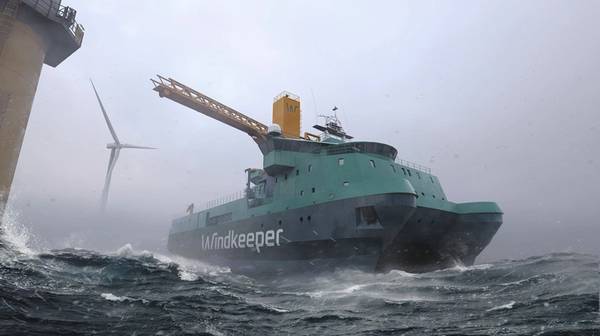
Turkish Cemre Shipyard has awarded HAV Group ASA’s subsidiary Norwegian Electric Systems AS (NES) a contract to deliver energy design, and smart control systems for two “Windkeeper” service operations vessels (SOV).
The Turkish shipyard is building the Windkeeper for the Norwegian firm GC Rieber Shipping.
NES’ scope of work is to manage the complete energy design plus act as system integrator for the vessels’ power system and smart control set-up. NES will supply frequency converters and electric motors for the propulsion system, battery system, transformers, main DC and AC switchboards, integrated automation system, integrated navigation system, and dynamic positioning system.
"This is a substantial contract for NES and HAV Group," HAV said without providing the exact order value.
Egil Bremnes, sales manager at NES said:"The primary purpose of tailoring the vessels’ energy design and smart control system is to meet the vessels’ strict requirements for redundancy and, and in an extension of this, optimized energy efficiency. In turn this translates directly to lower operating costs and emissions to air."
According to NES, the unique vessel design requires a power system topology that has a high number of redundancy zones.
"NES, together with the GC Rieber team, have developed a game-changing energy design that can be operated with a minimum of engines running. The degree of safety in combination with minimum fuel consumption is achieved by using NES portfolio of products, such as ESS, Quadro Master, Odin`s eye and smart control," NES said.
"These are highly innovative vessels, and we are delighted that Cemre Shipyard and GC Rieber Shipping have trusted NES with the task of making them as energy efficient as possible," Bremnes said
The Windkeeper SOVs are based on small waterplane area twin hull (SWATH) methodology and design, which the parties involved claim "offers the offshore wind market improved operability, ultra-low fuel consumption, and the option of fully electric operations in the field."
NES will design, assemble, and test the systems at its headquarters at Godvik outside Bergen, Norway. The company’s facilities in Egersund and Ålesund, Norway will also support the project. Delivery of the equipment is planned for the beginning of 2024. The recently established NES office in Istanbul, Turkey, will contribute with local yard support and commissioning.